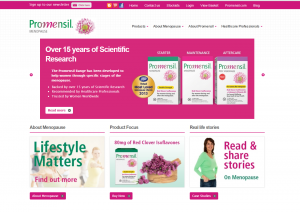PharmaCare seeks independent review of adverts for red clover menopause supplement
UK ad body flushed by ‘exaggerated’ on hold botanical claim

The statement came as part of a ruling against PharmaCare Europe, the UK-headquartered European subsidiary of Australian firm PharmaCare Laboratories, for its product Promensil.
In its national press and online adverts the company claimed the botanical product could help women “stay comfortable during the menopause” through its 80 mg dose of the ingredient red clover (Trifolium pratense).
The company said its marketing referenced a pending botanical health claim for Trifolium pratense, which claimed to help “maintain a [calm and] comfortable menopause”.
Yet the ASA told PharmaCare it had “exaggerated the claims submitted to EFSA [the European Food Safety Authority]” and also took offense to its claims of having professional healthcare backing and 15 years of supporting scientific evidence of efficacy.
"Because we considered the claims 'help you stay comfortable during the menopause' in ad (a) and 'recommended … to women who opt for a natural menopause' in ad (b), were broad references to the menopause, evidence would need to address all, or the majority, of menopausal symptoms and specifically those referred to in the on hold claim," the ASA said.
'We are challenging it'
James Stocker, head of marketing for the company, told us the ruling was the result of several months of a “relatively collaborative process” whereby the company had disagreed on certain points but accepted others.
“For the healthcare professional for example, even though we do work with a range of healthcare professionals we quickly recognised that we should not be doing that.”
However, other points proved more contentious and Stocker said the company would now submit an application for an independent review to challenge the ASA on the exaggeration of the health claim and the 15 years of evidence statement, which he said it now had enough evidence to prove.
“We are challenging it. But above all we will abide [by ASA’s ruling],” he said.
The botanical sector has been subject to a long-running disagreement on the kind of evidence required to prove efficacy.
There are about 2000 botanical health claims currently on hold as a result, of which 500 received a negative opinion from EFSA.
EFSA requires human studies to prove efficacy, but the majority of botanical health claim dossiers rely on 'traditional use' evidence.
Until there is a solution to this situation, these ‘on hold’ claims can be used by companies. Companies would only be obliged to remove such statements if the claim had been officially rejected or if no such claim had been logged in the first place.
Right to the source
The ASA acknowledged this was the case, but said the company had exaggerated the 'on hold' claim and placed too much focus on red clover’s isoflavones as the source of the purported health benefit.
“We therefore also considered the health claim in the ad did not properly reflect the on hold claim because it did not refer to the relevant ingredient. Furthermore, on hold claims should also be supported with adequate substantiation.”
Isoflavones are a class of phytochemicals - compounds found only in plants. They are found naturally in foods like soy, red clover and kudzu root.
There are no health claims approved for isoflavones in the EU, with 14 applications rejected many of which referred to the reduction of menopause symptoms.
The ASA noted the marketers could exercise “some flexibility in rewording claims”, but this rewording must not change the meaning for consumers.
PharmaCare markets several botanical products, including another red clover product for menopausal women, Menoflavon.
Asked if the company would take the ASA ruling as a guideline to legally marketing this product and others, Stocker said Menoflavon was not sold in the UK and its regulation would therefore be down to the authorities in the respective EU member states.
He declined to comment on the implications of the ruling for companies looking to use ‘on hold’ botanical health claims.
It was unclear how long the independent review process would take, but Stocker said in the meantime it would make changes to its advertisement to abide by the ASA’s recommendations.
“That’s taking effect from now,” he said.
At the time of publication the company’s Promensil-dedicated website still contained the claim that the product was backed by “15 years of scientific research” but did not appear to claim it was recommended by healthcare professionals.
The complaint was filed by a freelance health writer.

















